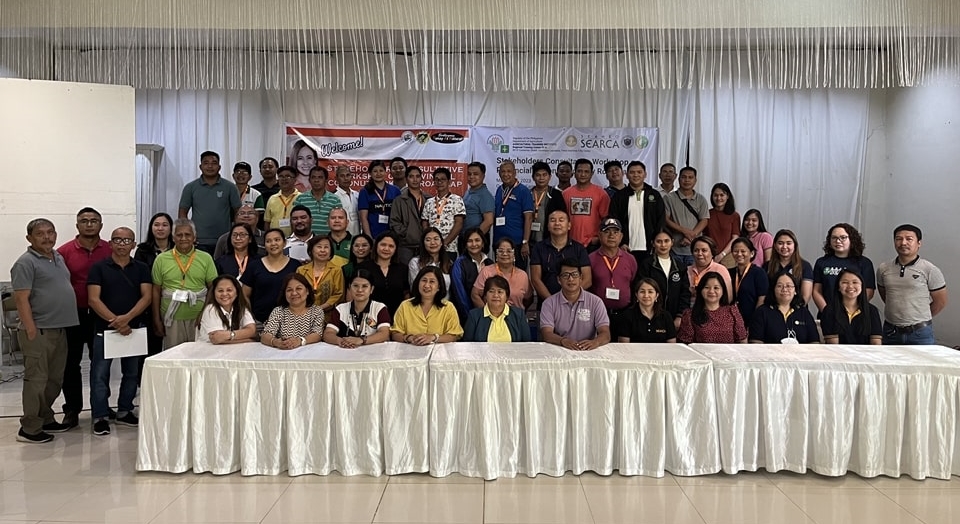LUCENA CITY, Quezon province—The Development of the Coconut Industry Growth Areas in the Province of Quezon project recently brought together various coconut industry stakeholders for a two-day workshop held on 16–17 May 2023 at Lucena City, Quezon province. This collaborative activity is organized by the Southeast Asian Regional Center for Graduate Study and Research in Agriculture (SEARCA), the Provincial Government of Quezon through the Office of the Provincial Agriculturist (OPAg), and the Philippine Coconut Authority (PCA) Region IV with support from the Department of Agriculture-Agricultural Training Institute (DA-ATI) CALABARZON (Cavite, Laguna, Batangas, Rizal, and Quezon). The workshop primarily aimed to gather inputs and recommendations from participants on the development of Quezon province’s coconut industry roadmap.
Dr. Ana Clarissa Mariano, provincial agriculturist (PA), delivered a welcome message expressing her sincere appreciation to all the agencies involved in supporting the Coconut Farmers Industry Development Program (CFIDP). She emphasized that based on available data, Quezon has the highest number of coconut trees and the largest population of farmers. With this, she highlighted the need for a well-structured coconut plan specific to the province. Dr. Mariano urged the participants to continue advancing and collaborating for the betterment of the coconut industry.

The first day of the workshop focused on an overview of the current situation of the province’s coconut industry presented by Mr. Russel Manuba, OPAg economist. This was followed by a presentation of the results of the initial strengths, weaknesses, opportunities, and threats (SWOT) analysis gathered during the back-to-back training workshops on roadmap development and marketing strategies conducted last February at SEARCA. The stakeholders were then divided into four groups, each focusing on a specific coconut-based commodity: virgin coconut oil (VCO), copra, coco sugar, and lambanog, which is a local coconut wine. Each group was asked to identify and discuss the SWOT of their respective commodities, which were later presented during plenary.
The second day was dedicated to action planning exercise. Mr. John Arrish Ocampo, planning officer, presented the roadmap’s vision, mission, goals, and key result areas (KRAs). He facilitated the discussions and noted the comments and suggestions raised by the various stakeholder groups. This was followed by the action planning workshop, in which the participants were again grouped by commodity and asked to identify specific strategies and key performance indicators in relation to the identified KRAs.
The workshop outputs will be consolidated and used as inputs to the coconut roadmap document. The roadmap is expected to provide a comprehensive strategy and action plan to guide the growth and development of Quezon province’s coconut industry, ensuring its long-term sustainability and prosperity in the years to come.
The workshop was attended by around 40 participants from numerous organizations, including DA, DA-ATI CALABARZON, Department of Trade and Industry (DTI)-Quezon, Technical Education and Skills Development Authority (TESDA)-Quezon, National Dairy Authority (NDA), Local Government of Agdangan-Office of the Municipal Agriculturist (OMA), local government unit (LGU)-Pagbilao, LGU-Tayabas, Office of the Municipal Agriculturist (OMA) Catanauan, Southern Luzon State University (SLSU), Land Bank of the Philippines, Quezon Federation and Union of Cooperatives, Pederasyon ng Magniniyog sa Quezon (PSMQ), Greenlife, Samahan ng Maniniyog at Maglalambanog sa Wakas at Ibabang Nangka (SAMAWIN), and Yakap at Halik Multi-Purpose Cooperative.